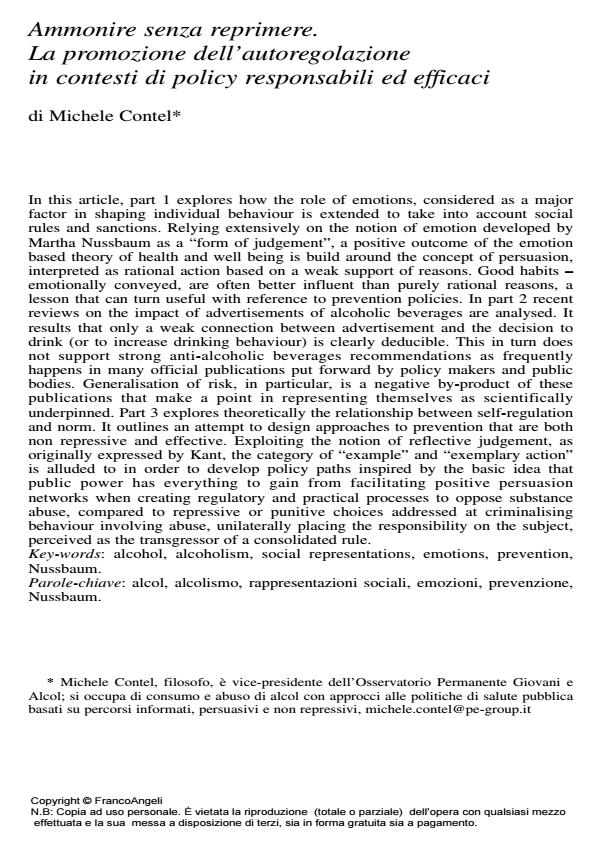Ammonire senza reprimere. La promozione dell’autoregolazione in contesti di policy responsabili ed efficaci
Journal title SALUTE E SOCIETÀ
Author/s Michele Contel
Publishing Year 2010 Issue 2010/Suppl 3
Language Italian Pages 23 P. 117-139 File size 315 KB
DOI 10.3280/SES2010-SU3008-ita
DOI is like a bar code for intellectual property: to have more infomation
click here
Below, you can see the article first page
If you want to buy this article in PDF format, you can do it, following the instructions to buy download credits

FrancoAngeli is member of Publishers International Linking Association, Inc (PILA), a not-for-profit association which run the CrossRef service enabling links to and from online scholarly content.
In this article, part 1 explores how the role of emotions, considered as a major factor in shaping individual behaviour is extended to take into account social rules and sanctions. Relying extensively on the notion of emotion developed by Martha Nussbaum as a "form of judgement", a positive outcome of the emotion based theory of health and well being is build around the concept of persuasion, interpreted as rational action based on a weak support of reasons. Good habits - emotionally conveyed, are often better influent than purely rational reasons, a lesson that can turn useful with reference to prevention policies. In part 2 recent reviews on the impact of advertisements of alcoholic beverages are analysed. It results that only a weak connection between advertisement and the decision to drink (or to increase drinking behaviour) is clearly deducible. This in turn does not support strong anti-alcoholic beverages recommendations as frequently happens in many official publications put forward by policy makers and public bodies. Generalisation of risk, in particular, is a negative by-product of these publications that make a point in representing themselves as scientifically underpinned. Part 3 explores theoretically the relationship between self-regulation and norm. It outlines an attempt to design approaches to prevention that are both non repressive and effective. Exploiting the notion of reflective judgement, as originally expressed by Kant, the category of "example" and "exemplary action" is alluded to in order to develop policy paths inspired by the basic idea that public power has everything to gain from facilitating positive persuasion networks when creating regulatory and practical processes to oppose substance abuse, compared to repressive or punitive choices addressed at criminalising behaviour involving abuse, unilaterally placing the responsibility on the subject, perceived as the transgressor of a consolidated rule.
Keywords: Alcohol, alcoholism, social representations, emotions, prevention, Nussbaum
Michele Contel, Ammonire senza reprimere. La promozione dell’autoregolazione in contesti di policy responsabili ed efficaci in "SALUTE E SOCIETÀ" Suppl 3/2010, pp 117-139, DOI: 10.3280/SES2010-SU3008-ita